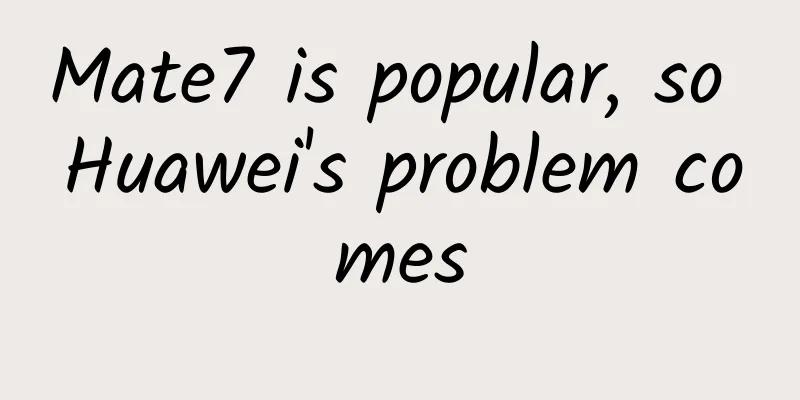Google is angry. Will the fragmentation of the Android system put an end to everyone being able to use Android 8.0?

|
The fragmentation of the Android system has always been a difficult problem. As an open source system, Android has been customized and beautified in various ways by different mobile phone manufacturers, and the entire ecosystem has been torn apart, resulting in serious out-of-sync upgrade progress among manufacturers. Regarding this, the one who is most frustrated is Google, the owner of the Android system. In fact, Google has been collecting statistics on the market share of each system version every month. According to the latest data on May 2, the combined market share of Nougat 7.0 and 7.1, which has been released for nearly a year, is only 7.1%, which is negligible compared to Lollipop and Marshmallow, which occupy half of the market share. In fact, Google has also made some efforts to solve the fragmentation problem. For example, in April last year, Google opened the developer preview version of Android 7.0 to a specific model of Sony Z3, hoping to bypass third-party manufacturers and push the new version of the system directly to users. However, this idea is not realistic because Google has limited energy and there are too many Android manufacturers and models, so it eventually came to nothing. Now, Google has proposed another project to solve the slow Android system upgrade problem, called Project Treble. Below, we will introduce to you in detail what this project is. The traditional Android system upgrade process is extremely inefficient First, let's take a look at the traditional Android system upgrade process. In simple terms, this process is divided into the following five steps. In the first step, Google's Android team will release the open source code of the latest version of the Android system to the outside world. In the second step, silicon wafer manufacturers, that is, mobile phone component companies, such as Qualcomm, MediaTek, etc., will customize and supplement the source code of the new Android system based on the conditions of their own mobile phone chips. In the third step, the mobile phone component company sends the modified code to manufacturers who design and manufacture Android phones, such as Xiaomi, OnePlus, etc. Mobile phone manufacturers will modify this version of the code again according to the needs of their models, such as customizing the kernel, adding their own UI and functions, etc. In the fourth step, mobile phone manufacturers and operators work together to test and certify the new system. In the fifth step, mobile phone manufacturers and operators push the new system to users in the form of OTA, or provide flashing packages for users to flash. In other words, the reason why we upgraded the system slowly in the past was not Google’s fault, but the different system experiences of different manufacturers. This is why manufacturers like LG and HTC upgrade very quickly, while some domestic manufacturers either wait for a year or two before upgrading, or directly pre-install the new system on the new phone. At the same time, it also reveals that the reason why third-party ROMs such as Lineage OS can let users experience the new system first is also related to bypassing the most time-consuming step of manufacturer customization. The biggest highlight of Treble is the simplified upgrade process Google has proposed a compatibility platform for developer APIs in the Compatibility Definition Document (CDD) and provided a Compatibility Suite (CTS). Just as developers can write applications that are compatible with any Android device, the Treble project transfers this solution from the app to the Android system framework. In short, Project Treble can be compatible with the Android system framework just like different mobile phones are compatible with apps. Its core concept is to completely separate the Android system framework from the low-level software code written by chip manufacturers such as Qualcomm. As mentioned above, the problem of slow Android system upgrade speed lies in the third step of mobile phone manufacturer customization. This step must be started after the second step of chip manufacturer code modification is completed. In the future, mobile phone manufacturers can start some work on adapting the new Android system without waiting for the chip manufacturer's code. The second and third steps can be carried out simultaneously instead of in sequence, and the five steps are simplified to four. The following comparison chart illustrates the intuitive difference before and after the Treble project is enabled. Before enabling, when the device wants to upgrade to the latest Android system, all codes need to be updated. After being enabled, a portion of the code exists as a specific part and does not need to be updated by the manufacturer, which is more time-saving and efficient. The upgrade process for Android 8.0 will start the Treble project for the first time According to Google, Project Treble will be implemented for the first time in Android O, which is the update of Android 8.0. At the upcoming I/O conference this week, Google is expected to officially release the Android O operating system, and the developer preview version of the system has been launched. According to the process, the new system will complete the iteration of the preview version in August-September and release the first official version for Pixel and Nexus users to upgrade. Most third-party manufacturers will also plan to start the adaptation work of the Android 8.0 system at that time. According to the progress of the Treble project, the upgrade speed should be significantly improved compared to last year's Android 7.0, and there may also be a breakthrough in the popularity of old models. After all, in the past, only the flagship models of the year were upgraded and released first. Do you think Project Treble is a good idea? As a winner of Toutiao's Qingyun Plan and Baijiahao's Bai+ Plan, the 2019 Baidu Digital Author of the Year, the Baijiahao's Most Popular Author in the Technology Field, the 2019 Sogou Technology and Culture Author, and the 2021 Baijiahao Quarterly Influential Creator, he has won many awards, including the 2013 Sohu Best Industry Media Person, the 2015 China New Media Entrepreneurship Competition Beijing Third Place, the 2015 Guangmang Experience Award, the 2015 China New Media Entrepreneurship Competition Finals Third Place, and the 2018 Baidu Dynamic Annual Powerful Celebrity. |
<<: PSA joins hands with Huawei to create a connected car phone to take over all car information
>>: "Smarter Companionship" GAC New Energy's Intelligent Technology Leads the Beijing Auto Show
Recommend
Which behaviors that you think are sick are actually "physiological preferences"?
【Written at the end】 Love is the result of long-t...
Emergency Science Popularization - Illustration of Earthquake Intensity
Earthquake intensity refers to the degree to whic...
Is the “Christmas hat” that is flooding the WeChat Moments an accidental “scam”? 5000 words to restore the whole incident
Around 10 p.m. on December 22, 2017, the WeChat M...
Is there still any fun to play with Android without its “personal customization”?
Andrew Cunningham, a product expert at the well-kn...
Why doesn't Apple use an "iWatch"?
According to Reuters, Apple Inc. (hereinafter ref...
Audi uses projection to replace the central control screen, allowing you to lie in the car and watch movies
Autonomous driving is getting closer and closer t...
Domestic mobile phones have entered the wrong path of "cost-effectiveness"
[[143498]] When it comes to domestic mobile phone...
The hot-selling "bare leg artifact" is actually a "modern torture device"? A 23-year-old girl got paronychia from being strangled...
The cold wind is blowing You who love beauty Have...
Simple brick-moving project: PPT extension project, how can it help you make money without doing anything?
Many friends think that interest is the basis of ...
Chinese scientists decipher ancient mystery of biosynthesis
Chitin biosynthesis is an ancient and conserved s...
The impact of domain names and space on search engines
1. The impact of domain names on search engines (...
China’s new energy vehicle batteries have CATL, when will domestic electronic control chips arrive?
The recent ZTE incident in the communications fie...
iOS 13.5 Blizzard new jailbreak tool with built-in Zebra Store
When everyone was looking forward to the news of ...
If creativity is not enough, then malicious intent can be used to make up for it. Because the prospects for iPhone 7 are worrying, what tricks has Apple invented?
Since the death of Steve Jobs, the voices critici...
Sparking heated discussion: Can microplastics in takeout really invade the brain within two hours?
Previously, the topic #Microplastics in takeout c...









